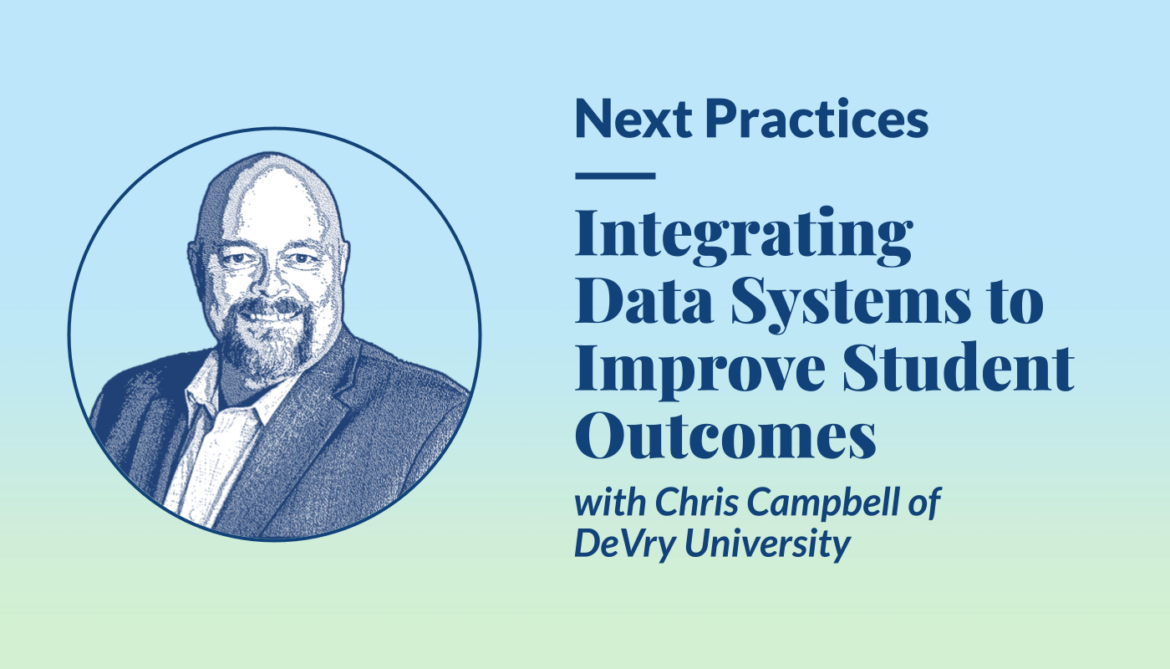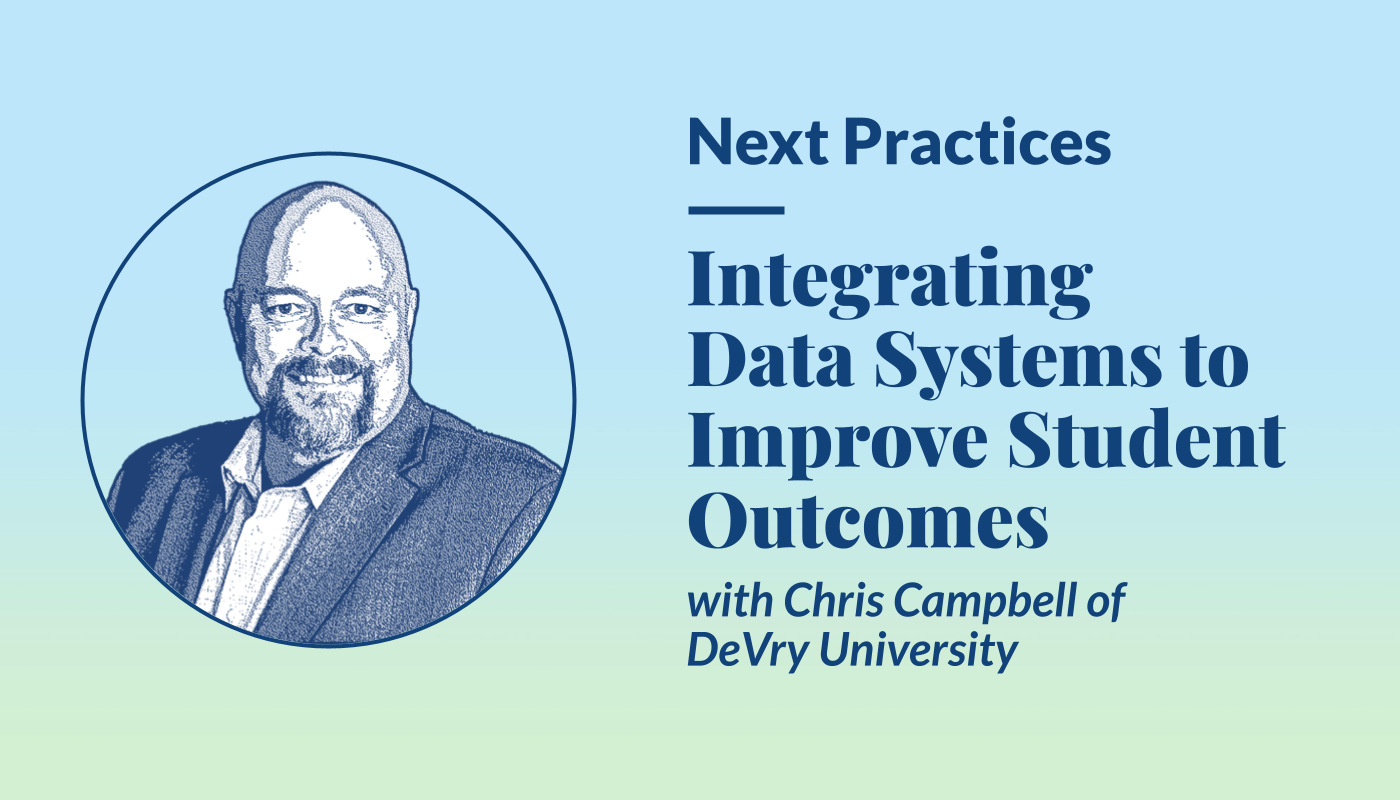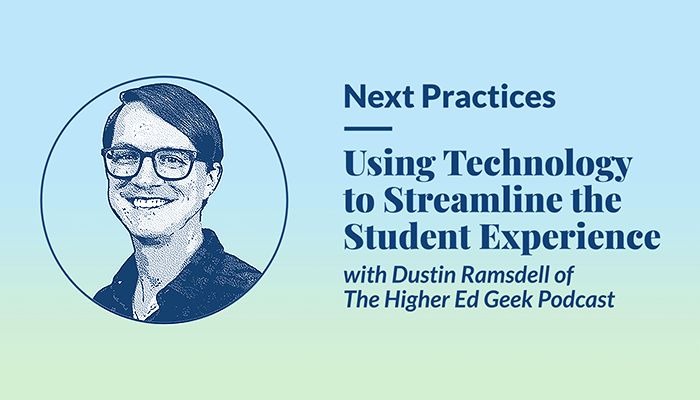
Integrating Data Systems to Improve Student Outcomes with Chris Campbell
Share this Post
Subscribe: Spotify | Apple Podcasts | Youtube Music | Full Transcript
As technology evolves and students’ needs change, institutions are looking to stay ahead of the curve by making data-informed decisions. In a conversation with Chris Campbell, Chief Information Officer at DeVry University, we learn how their institution is closing student opportunity gaps through its award-winning technology systems and continuous data evaluation.
DeVry University’s data-centric approach to student success starts with bringing data together into a cohesive digital environment. It’s in this unified data where advisors and faculty can see a broader view of the student journey, and use those insights to provide proactive care for students.
Campbell notes that data collection is an ongoing process and that it’s important to assess frequently how strategies should change according to evolving student data. “We are always looking at the data, evaluating it, reevaluating it..we make changes to how certain things work when we’re not seeing the results that we expect.
Modernize and consolidate data systems
Before DeVry University adopted its current data lake, consolidating data from disparate systems was a manual, time-consuming process. Collecting and evaluating data in a timely manner was one of their top challenges, so they partnered with Civitas Learning to build a data lake to expedite the process and free up time to be more actionable. Pulling data from a handful of key systems like SIS, LMS, and CRM, they keep all relevant student data in a central hub to help understand students and provide better opportunities.
Make data-driven changes to student outreach
Today’s students have specific preferences regarding when, where, and how they interact with their institutions. For example, students with daytime responsibilities or full-time work may only be able to check their email in the evenings. Using data to discover when students are active online and which platforms they’re on enables institutions to improve communication and increase engagement.
That’s exactly what DeVry University did when they began their work to develop a digital care engine. After discovering most of their students logged into the portal in the evenings, they started sending emails in the evening to ensure students would see their messages while they were active online. They also adjusted their messaging to provide actionable, in-the-moment opportunities. These simple changes resulted in a big uptick in open and click-through rates.
To amp up their social media engagement, DeVry University started a “good job” outreach campaign to encourage and celebrate student success. Staff would send a note to any student who received an A in their class, congratulating them on their success and providing a link to share with friends and family on social media. Not only did the campaign generate new activity on social media platforms, but they also saw retention improvements as a result of their intentional emotional support.
Provide holistic support
Although data informs many student success strategies, it shouldn’t be exclusive. DeVry University blends data insights with behavioral psychology to create a holistic picture of the total student journey. Campbell affirms the importance of combining behavioral methods to help encourage and support students: “It’s wonderful what the data tells us, but let’s think about the student as a person, as an individual, and let’s craft that support they need in the way they need it.”
Collaborate with functional teams
DeVry adopts a hybrid approach to leveraging data, combining both data analysis across various functional teams with centralized data management. Once departments analyze and validate their data separately, they deliver those insights in a highly centralized format for everyone to see. While teams are continuously analyzing and managing data, they do have a digital care engine steering committee that meets on a regular basis to discuss areas of opportunity. This committee is made up of representatives from numerous student-facing departments to share both data-driven and anecdotal feedback on what students need. With an ongoing commitment to discovering new student insights, teams can collaborate to find solutions that work.
Foster community with students and staff
Working adults beginning their higher education journey will undoubtedly have questions and concerns about how to succeed. DeVry has found that connecting students with like-minded peers and encouraging them to participate in the new student orientation helps students acclimate and lays the foundation for future academic success.
To help with this, their teams are working on automating various points in the new student journey to make each touchpoint personal and efficient. This commitment to student care, with the help of their care engine, has resulted in positive student feedback, with many saying, “This is the first time somebody (my advisor or my faculty member) has really cared about my future and my education.”
Listen to the full episode of Next Practices to learn more about how DeVry University is using data to build supportive relationships with students and staff.



